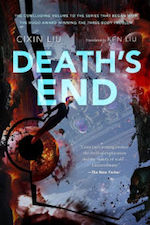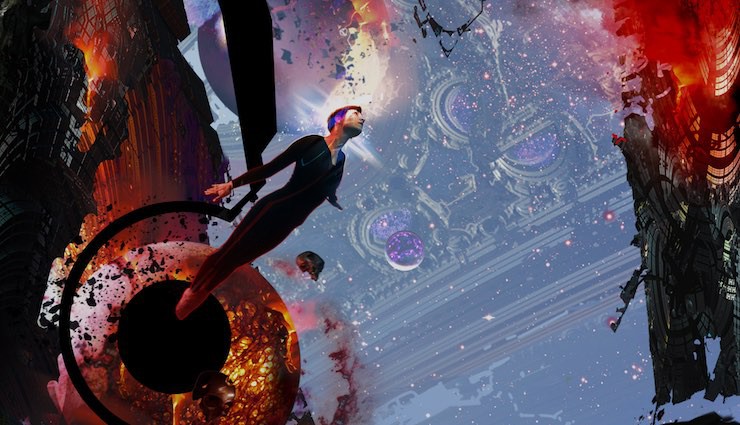Article translated by Ken Liu.
Compared to the first two volumes in the “Three-Body” trilogy (The Three-Body Problem and The Dark Forest), Death’s End has a more intense dose of my personal style. I strove to write a purer science fictional novel, and wanted to go as far as possible with wild speculations. Thus, I put in the idea of altering the natural laws of the universe as weapons in interstellar warfare, and consequently, the universe and its laws are seen as the leftover mess from a feast of the gods, a strange universe in which the Solar System falls into ruin in a morbid, poetic manner…
Before the book’s publication in China, my publisher and I were both rather pessimistic concerning its commercial prospects. I wrote a novel that I thought only extreme and hardcore fans would read because it satisfied their narrow definition of “science fiction.” In the words of Chinese SF critics, Death’s End was an example of “science fictional fundamentalism.”
Unexpectedly, Death’s End turned into a major success. It made a much bigger impact than the first two books in the series and became a bestseller. Readers who normally never touched science fiction picked it up, and the book influenced the conversation on multiple subjects, drawing mainstream attention to Chinese SF for the first time.
Contemporary Chinese science fiction is following a path similar to that taken by American science fiction. Over time, literary sophistication has become favored over scientific imagination. Science fiction is becoming “softer,” and a new generation of writers have turned away from the Campbellian aesthetic ideal that we once pined for. Even I, who claimed to be “the most stubborn scifi fan,” harbored doubts about that traditional science fictional ideal. I questioned whether it had lost its appeal; I felt like a lonely defender of a territory that no one was interested in anymore.
As it turned out, I was wrong. Science fiction in the classical sense, for hardcore fans, still had a vitality. It reminded me of the philosophical adage that a principle, no matter how unfashionable, could not be deemed to be dead.
In Death’s End, I had to face head-on a subject that was only tangential in The Three-Body Problem and The Dark Forest, the apocalypse. This may be a clichéd topic for Western science fiction, but for Chinese writers and readers, the apocalypse held an extra layer of meaning.
In the century-long history of Chinese science fiction, apocalyptic themes were mostly absent. This was especially true in the period before the 1990s, when Chinese science fiction, isolated from the influence of the West, developed on its own. Although I’m quite familiar with the history of Chinese science fiction, I can’t recall a single Chinese story or novel about the apocalypse in the period from the beginning of the twentieth century to the 1990s. The absence has to do with Chinese culture. Christianity in the West is vitally concerned with eschatology, but Chinese culture almost doesn’t have the concept of end times. In ancient Chinese mythology, there’s a beginning to the world (e.g., the god Pan Gu dividing the heavens from the earth out of primeval chaos, the goddess Nü Wa creating the human race out of mud, etc.), but no end point. In the Chinese subconscious, the universe exists on a timeline that extends into the future without end, and also without change. In such a cultural milieu, writing an apocalyptic tale that starts with the present, goes through the destruction of the Solar System, and ends with the literal end of the universe, brought with it a frisson of excitement that Western writers approaching the same topic may not experience.
I soon discovered that writing an apocalypse that adhered to the rigorous logic of rational speculation was extremely difficult. Facing ultimate destruction and the end of the world, human society will undergo extreme, complex, and profound transformations. Such transformations will penetrate into politics, economics, culture, and every other field, and impact every social class, fundamentally changing how each individual lives out the little time left to them. At first, I wanted to paint a panoramic picture of a society facing the apocalypse and describe humanity in its last days through a large number of characters and a massive amount of details—a sort of science fictional version of War and Peace or the influential Chinese novel Ordinary World, by Lu Yao. But then I discovered that it was impossible to realize my grand vision within the length of a novel (or at least not a readable novel). I had to return to the tropes and techniques from science fiction that I had hoped to transcend: to write the future as a historical romance.
It’s common for science fiction describing the progress of an entire world to take this approach. In such works, history, romanticized, is the creation of a few characters who are akin to legendary figures, and the progress of the world is within the control of just a small number of characters. Rationally, such tales are unrealistic, and I wrote Death’s End this way only because I couldn’t see another way. Thus, the fate of the world in the novel is controlled by the decisions of a few savior characters. I made an effort to at least make them into symbols for certain social classes or types. For instance, Cheng Xin, the protagonist, is a representative of what are, by contemporary consensus, the correct morals and values of humanity. Bathed in light and justice, she strides into the apocalypse. The character of Cheng Xin is an attempt at realizing one particularly appealing characteristic of science fiction: by changing the premises of the fictional world, what is bright and noble in our real world can turn dark and evil, and vice versa. The topic of the apocalypse provides a grand thought experiment laboratory in which the morals and value systems of the real world may be subjected to pressures that will render them as pliable as clay.
Death’s End is not a perfect work, but it is the kind of science fiction I most wanted to write. I hope American readers enjoy it.
Cixin Liu is a representative of the new generation of Chinese science fiction authors and recognized as a leading voice in Chinese science fiction. He is a member of the China Science Writers’ Association and the Shanxi Writers’ Association. He was awarded the China Galaxy Science Fiction Award for eight consecutive years, from 1999 to 2006, and again in 2010. He received the Nebula (Xingyun) Award in both 2010 and 2011. His Remembrance of Earth’s Past trilogy is now available in English from Tor Books, translated by Ken Liu.
is a representative of the new generation of Chinese science fiction authors and recognized as a leading voice in Chinese science fiction. He is a member of the China Science Writers’ Association and the Shanxi Writers’ Association. He was awarded the China Galaxy Science Fiction Award for eight consecutive years, from 1999 to 2006, and again in 2010. He received the Nebula (Xingyun) Award in both 2010 and 2011. His Remembrance of Earth’s Past trilogy is now available in English from Tor Books, translated by Ken Liu.
 Ken Liu is an author and translator of speculative fiction, as well as a lawyer and programmer. His fiction has appeared in The Magazine of Fantasy & Science Fiction, Asimov’s, Analog, Clarkesworld, Tor.com, Lightspeed, and Strange Horizons, among other places. He is a winner of the Nebula, Hugo, and World Fantasy awards. Ken’s debut novel, The Grace of Kings (2015), is the first volume in a silkpunk epic fantasy series, The Dandelion Dynasty. It won the Locus Best First Novel Award and was a Nebula finalist. He also has a collection of short fiction, The Paper Menagerie and Other Stories (2016). He lives with his family near Boston, Massachusetts.
Ken Liu is an author and translator of speculative fiction, as well as a lawyer and programmer. His fiction has appeared in The Magazine of Fantasy & Science Fiction, Asimov’s, Analog, Clarkesworld, Tor.com, Lightspeed, and Strange Horizons, among other places. He is a winner of the Nebula, Hugo, and World Fantasy awards. Ken’s debut novel, The Grace of Kings (2015), is the first volume in a silkpunk epic fantasy series, The Dandelion Dynasty. It won the Locus Best First Novel Award and was a Nebula finalist. He also has a collection of short fiction, The Paper Menagerie and Other Stories (2016). He lives with his family near Boston, Massachusetts.










